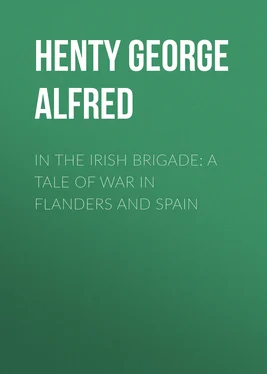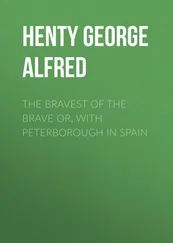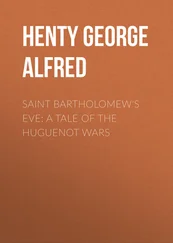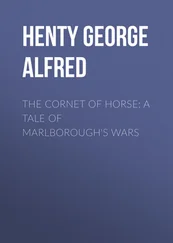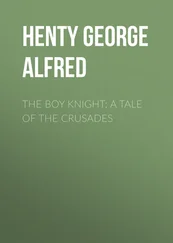George Henty - In the Irish Brigade - A Tale of War in Flanders and Spain
Здесь есть возможность читать онлайн «George Henty - In the Irish Brigade - A Tale of War in Flanders and Spain» — ознакомительный отрывок электронной книги совершенно бесплатно, а после прочтения отрывка купить полную версию. В некоторых случаях можно слушать аудио, скачать через торрент в формате fb2 и присутствует краткое содержание. Жанр: foreign_children, foreign_antique, foreign_prose, на английском языке. Описание произведения, (предисловие) а так же отзывы посетителей доступны на портале библиотеки ЛибКат.
- Название:In the Irish Brigade: A Tale of War in Flanders and Spain
- Автор:
- Жанр:
- Год:неизвестен
- ISBN:нет данных
- Рейтинг книги:5 / 5. Голосов: 1
-
Избранное:Добавить в избранное
- Отзывы:
-
Ваша оценка:
- 100
- 1
- 2
- 3
- 4
- 5
In the Irish Brigade: A Tale of War in Flanders and Spain: краткое содержание, описание и аннотация
Предлагаем к чтению аннотацию, описание, краткое содержание или предисловие (зависит от того, что написал сам автор книги «In the Irish Brigade: A Tale of War in Flanders and Spain»). Если вы не нашли необходимую информацию о книге — напишите в комментариях, мы постараемся отыскать её.
In the Irish Brigade: A Tale of War in Flanders and Spain — читать онлайн ознакомительный отрывок
Ниже представлен текст книги, разбитый по страницам. Система сохранения места последней прочитанной страницы, позволяет с удобством читать онлайн бесплатно книгу «In the Irish Brigade: A Tale of War in Flanders and Spain», без необходимости каждый раз заново искать на чём Вы остановились. Поставьте закладку, и сможете в любой момент перейти на страницу, на которой закончили чтение.
Интервал:
Закладка:
G. A. Henty
In the Irish Brigade: A Tale of War in Flanders and Spain
Preface
The evils arising from religious persecution, sectarian hatred, ill government, and oppression were never more strongly illustrated than by the fact that, for a century, Ireland, which has since that time furnished us with a large proportion of our best soldiers, should have been among our bitterest and most formidable foes, and her sons fought in the ranks of our greatest continental enemy. It was not because they were adherents of the house of Stuart that Irishmen left their native country to take service abroad, but because life in Ireland was rendered well-nigh intolerable for Catholics, on account of the nature and severity of the laws against them, and the bitterness with which those laws were carried into effect.
An Irish Catholic had no prospects of employment or advancement at home. He could hold no civil appointment of any kind. He could not serve as an officer, nor even enlist as a private, in the army. He could not hold land. He was subject to imprisonment, and even death, on the most trifling and frivolous accusations brought against him by the satellites of the Irish Government. Not only could he not sit in the parliament of Dublin, but he could not even vote at elections. It was because they believed that the return of the Stuarts would mean relief, from at least some of their disabilities, and liberty to carry out the offices of their religion openly, and to dwell in peace, free from denunciation and persecution, that the Irish remained so long faithful to the Jacobite cause.
It was not, indeed, until 1774 that the Catholics in Ireland were admitted to qualify themselves as subjects of the crown, and not until the following year that they were permitted to enlist in the army. Irish regiments had enlisted in France, previous to the Convention of Limerick; but it was the Irish army that defended that town, and, having been defeated, passed over to France, that raised the Irish Brigade to the position of an important factor in the French army, which it held for nearly a hundred years, bearing a prominent part in every siege and battle in Flanders, Germany, Italy, and Spain. A long succession of French marshals and generals have testified to the extraordinary bravery of these troops, and to their good conduct under all circumstances. Not only in France did Irishmen play a prominent part in military matters, but they were conspicuous in every continental army, and their descendants are still to be found bearing honoured names throughout Europe.
Happily, those days are past, and for over a hundred years the courage and military capacity of Irishmen have been employed in the service of Great Britain. For records of the doings of some of the regiments of the Irish Brigade, during the years 1706-1710, I am indebted to the painstaking account of the Irish Brigade in the service of France, by J. C. O'Callaghan; while the accounts of the war in Spain are drawn from the official report, given in Boyer's Annals of the Reign of Queen Anne, which contains a mine of information of the military and civil events of the time.
G. A. Henty.Chapter 1: Fresh from Ireland
A number of officers of O'Brien's regiment of foot, forming a part of the Irish Brigade in the service of France, were gathered in a handsome apartment in the Rue des Fosses, on the 20th of June, 1701, when the door opened, and their colonel entered with a young officer in the uniform of the regiment.
"I have asked you here, gentlemen all," he said, "to present to you a new comrade, Desmond Kennedy, who, through the good offices of the Marshal de Noailles, has been appointed, by His Gracious Majesty, to a cornetcy in our regiment.
"Now, gentlemen, I have known, and doubtless you can all of you recall, instances where the harmony of a regiment has been grievously disturbed, and bad blood caused, owing to the want of a clear understanding upon matters connected with a family; which might have been avoided, had proper explanations been given at the commencement. I have spoken frankly to Mr. Kennedy, and he has stated to me certain particulars, and has not only authorized me, but requested me to repeat them to you, feeling that you had a right to know who it was that had come among you, and so to avoid questioning on matters that are, of all others, prone to lead to trouble among gentlemen.
"Beyond the fact that he is a Kennedy, and that his father had to fly from Ireland, two years after the siege of Limerick, owing to a participation in some plot to bring about a fresh rising in favour of King James, he is unacquainted with his family history. He has never heard from his father, and only knows that he made for France after throwing the usurper's spies off his track, and there can be little doubt that it was his intention to take service in this brigade. There have been several Kennedys in the service, and I have little doubt that this young gentleman's father was the Murroch Kennedy who joined the third regiment, about that time, and was killed a few months afterwards at the battle of Breda. His death would account for the fact that his son never received a letter from him. At the time when he left Ireland, the child was some two years old, and, as communication was difficult, and the boy so young, Murroch might very well have put off writing until the boy grew older, not thinking that death might intervene, as it did, to prevent his doing so.
"This is all simple and straightforward enough, and you will, I am sure, have no hesitation in extending the hand of friendship to the son of a gallant Irishman, who died fighting in the ranks of the Irish Brigade, exiled, like the rest of us, for loyalty to our king.
"Still, gentlemen, you might, perhaps, wonder how it is that he knows no more of his family, and it was that this question might be disposed of, once for all, that I am making this statement to you on his behalf. He was not brought up, as you might expect, with some of his father's connections. Whether the family were so scattered that there was no one to whom he could safely entrust the child, I know not, but, in point of fact, he sent him to one of the last houses where a loyal gentleman would wish his son to be brought up. We all know by name and reputation–I and your majors knew him personally–the gallant James O'Carroll, who died, fighting bravely, at the siege of Limerick. He was succeeded in his estate by his brother John, one of the few Irishmen of good family who turned traitor to his king, and who secured the succession to his brother's possessions by becoming an ardent supporter of the usurper, and by changing his religion.
"Why Murroch Kennedy should have chosen such a man as the guardian of his son is a mystery. Whether they had been great friends in earlier times, when John O'Carroll professed as warm an attachment to the Stuart cause as did his brother James, or whether Kennedy possessed such knowledge of O'Carroll's traitorous dealings with the Dutchman as would, if generally known, have rendered him so hateful to all loyal men that he could no longer have remained in the country, and so had a hold over him, Mr. Kennedy can tell us nothing. He was brought by his nurse to Castle Kilkargan, and was left with John O'Carroll. It is clear that the latter accepted the charge unwillingly, for he sent the child to a farm, where he remained until he was eight years old, and then placed him with the parish priest, who educated him. The lad visited at the houses of the neighbouring gentry, shot and rowed and fished with their sons. O'Carroll, however, beyond paying for his maintenance, all but ignored his existence, showing no interest whatever in him, up to the time when he furnished him with a letter of introduction to de Noailles, except that he made him a present of a gun, as soon as he became of an age to use one. He never attempted to tamper with his loyalty to King James, and in fact, until he sent for him to ask what profession he would choose, he never exchanged ten words with him, from the time that he was brought to the castle.
Читать дальшеИнтервал:
Закладка:
Похожие книги на «In the Irish Brigade: A Tale of War in Flanders and Spain»
Представляем Вашему вниманию похожие книги на «In the Irish Brigade: A Tale of War in Flanders and Spain» списком для выбора. Мы отобрали схожую по названию и смыслу литературу в надежде предоставить читателям больше вариантов отыскать новые, интересные, ещё непрочитанные произведения.
Обсуждение, отзывы о книге «In the Irish Brigade: A Tale of War in Flanders and Spain» и просто собственные мнения читателей. Оставьте ваши комментарии, напишите, что Вы думаете о произведении, его смысле или главных героях. Укажите что конкретно понравилось, а что нет, и почему Вы так считаете.
